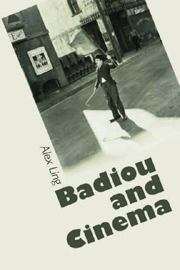Book contents
- Frontmatter
- Contents
- Acknowledgements
- Abbreviations of Frequently Cited Texts
- Introduction: Gorky's Maxim
- 1 Presenting Alain Badiou
- 2 Can Cinema be Thought?
- 3 In the Kingdom of Shadows
- 4 An Aesthetic of Truth
- 5 An Instant or an Eternity: Thinking Cinema After Deleuze
- 6 Alain Resnais and the Mise en Scène of Two
- 7 The Castle of Impurity
- Conclusion: The Future of an Illusion
- Bibliography
- Filmography
- Index
Introduction: Gorky's Maxim
Published online by Cambridge University Press: 12 September 2012
- Frontmatter
- Contents
- Acknowledgements
- Abbreviations of Frequently Cited Texts
- Introduction: Gorky's Maxim
- 1 Presenting Alain Badiou
- 2 Can Cinema be Thought?
- 3 In the Kingdom of Shadows
- 4 An Aesthetic of Truth
- 5 An Instant or an Eternity: Thinking Cinema After Deleuze
- 6 Alain Resnais and the Mise en Scène of Two
- 7 The Castle of Impurity
- Conclusion: The Future of an Illusion
- Bibliography
- Filmography
- Index
Summary
Last night I was in the Kingdom of Shadows. If only you knew how strange it was to be there. It is a world without sound, without colour. Everything there – the earth, the trees, the people, the water and the air – is dipped in monotonous grey. Grey rays of sun across the grey sky, grey eyes in grey faces, and the leaves of the trees are ashen grey. It is not life but its shadow, it is not motion but its soundless spectre.
Maxim GorkyAlmost two-and-a-half millennia have passed since the mythical prisoner of Plato's Republic first stumbled bleary-eyed from the ancient screening room of the cave to gaze upon the brilliance of the sun. Yet it is today, in our so-called ‘postmodern’ world – a world in which Plato has supposedly been ‘overturned’, in which truth finds itself on equal footing with opinion – that we need more than ever to turn to those principles underlying Platonism: to the foundational role of mathematics, to the ‘supreme genera’ of Ideas, to the possibility of real thought (outside of the calculable machinations of constituted knowledges); in a word, to the possibility of novel and disruptive truths.
While it was for Plato imperative that the prisoner become a philosopher only after he had escaped the shadow-world of the cave and gazed upon the sun, contemporary doxa effectively holds that the philosopher is born as such in the cave, for if he knows anything it is that there is no sun to speak of, only an endless expanse of darkness.
- Type
- Chapter
- Information
- Badiou and Cinema , pp. 1 - 13Publisher: Edinburgh University PressPrint publication year: 2010



